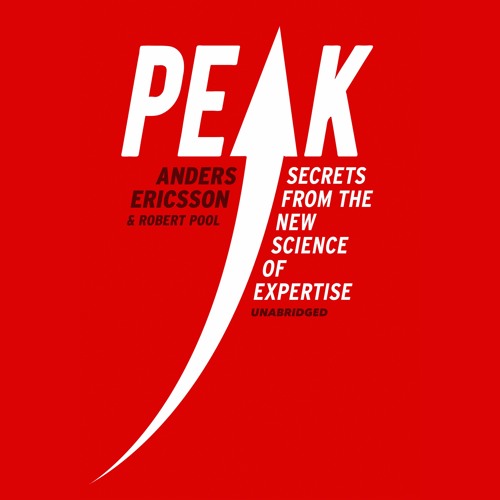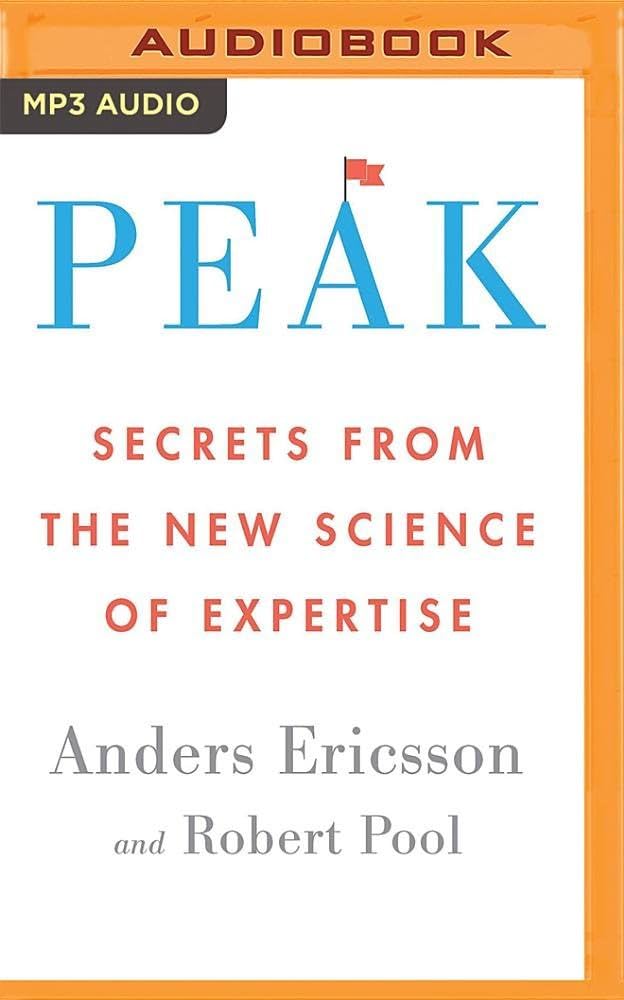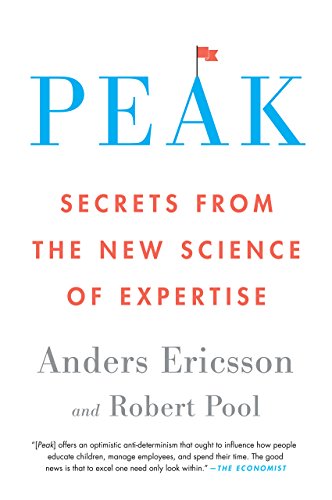K. Anders Ericsson’s “Peak” delves into the science of expertise and mastery. It outlines how deliberate practice leads to exceptional performance.
“Peak” by K. Anders Ericsson explores the fascinating world of human performance and expertise. The book argues that innate talent is overrated, and deliberate practice is the key to achieving mastery. Ericsson’s research reveals that anyone can improve their skills through focused and sustained effort.
The audiobook provides practical tips and real-life examples to illustrate its points. Readers will find actionable insights on how to apply deliberate practice in various fields. Whether you’re an athlete, musician, or business professional, “Peak” offers valuable lessons on reaching your highest potential. This book is a must-read for those looking to elevate their skills and performance.
Introduction To K. Anders Ericsson And ‘peak’
K. Anders Ericsson was a Swedish psychologist. He was known for his research on the psychology of expertise. His book, ‘Peak’, explores how to achieve the highest levels of performance. Ericsson’s work has influenced many fields, from sports to music.
The Genesis Of ‘peak’
Ericsson’s book, ‘Peak’, was published in 2016. It is based on his extensive research on human performance. The book explains how anyone can achieve mastery. It emphasizes the importance of deliberate practice.
| Year | Event |
|---|---|
| 1993 | Ericsson coined the term “deliberate practice” |
| 2016 | ‘Peak’ was published |
Ericsson’s Influence On Performance Psychology
Ericsson’s research changed how we understand performance. His idea of deliberate practice is now widely accepted. Many top performers use his methods. His work shows that talent is not enough. Hard work and the right practice are key.
- Deliberate practice involves focused, goal-oriented activities.
- Feedback is essential for improvement.
- Consistency and effort lead to mastery.
Ericsson’s ideas have influenced coaches, teachers, and trainers. His work proves that anyone can improve with the right methods. The principles in ‘Peak’ apply to all areas of life.

Deliberate Practice: Core Principle
Deliberate practice is the heart of mastery, as explained by K. Anders Ericsson in his audiobook Peak. This principle is not about mindless repetition. It’s a structured, focused way to improve skills.
Defining Deliberate Practice
Deliberate practice involves specific goals and constant feedback. Unlike regular practice, it requires pushing beyond comfort zones. You need a clear plan and expert guidance.
- Specific Goals: Break down tasks into smaller, achievable parts.
- Constant Feedback: Get immediate feedback to correct mistakes.
- Expert Guidance: Work with coaches or mentors to refine skills.
Differentiating From Regular Practice
Regular practice often means repeating tasks without focus. Deliberate practice is different. Here’s a comparison:
| Aspect | Regular Practice | Deliberate Practice |
|---|---|---|
| Goal | General improvement | Specific skills |
| Feedback | Infrequent | Immediate and constant |
| Effort | Comfortable | Challenging |
| Guidance | Self-directed | Expert-driven |
In Peak, Ericsson shows that deliberate practice leads to excellence. It’s the secret behind top performers in every field.
Components Of Deliberate Practice
The audiobook “Peak” by K. Anders Ericsson dives deep into the concept of deliberate practice. This practice is the secret sauce behind the success of top performers in various fields. Understanding its components can help anyone improve their skills dramatically.
Purposeful Tasks
Deliberate practice starts with purposeful tasks. These tasks are not random. They are designed to improve specific skills. Each task should have a clear goal. For example, a pianist may focus on perfecting a difficult piece. The task should be challenging but achievable.
A table can be useful to outline purposeful tasks:
| Task | Goal | Outcome |
|---|---|---|
| Scales Practice | Improve finger agility | Faster play, fewer mistakes |
| Complex Piece | Master difficult sections | Better performance |
Immediate Feedback
Getting immediate feedback is crucial for deliberate practice. Feedback helps correct mistakes quickly. It shows what to improve next. For instance, a tennis player might use a coach to spot errors. Feedback should be specific and actionable.
Here are some sources of immediate feedback:
- Coaches
- Self-recordings
- Peer reviews
Stepping Outside Comfort Zone
Deliberate practice requires stepping outside the comfort zone. This means trying tasks that are hard and uncomfortable. Growth happens in this zone. For example, a writer might experiment with new genres. Each step outside the comfort zone builds new skills.
Consider these tips for stepping outside your comfort zone:
- Set higher goals
- Try new methods
- Embrace challenges

Applications Of Deliberate Practice
Deliberate practice is a powerful concept explored in the audiobook “Peak” by K. Anders Ericsson. This method involves focused, repetitive practice aimed at improving specific skills. The applications of deliberate practice span various fields, showing its versatility and effectiveness.
In Music And Sports
In music, deliberate practice involves breaking down complex pieces. Musicians focus on difficult sections repeatedly. They aim to master every note and rhythm. This approach helps musicians enhance their performance rapidly.
In sports, athletes use deliberate practice to improve specific skills. For example, a basketball player might practice free throws for hours. They analyze their technique and make adjustments. This focused effort leads to significant improvements in performance.
In Academics And Professional Skills
In academics, deliberate practice helps students excel. They tackle challenging problems repeatedly. This method builds deep understanding and boosts grades.
Professionals use deliberate practice to enhance job-related skills. For example, a public speaker might rehearse speeches multiple times. They focus on improving delivery and timing. This leads to more effective and confident presentations.
| Field | Example | Outcome |
|---|---|---|
| Music | Practicing complex pieces | Enhanced performance |
| Sports | Practicing free throws | Improved accuracy |
| Academics | Solving challenging problems | Better grades |
| Professional Skills | Rehearsing speeches | Effective presentations |
Deliberate practice is a proven method for achieving excellence. It is about focused, repetitive effort and continuous improvement.
Myths About Talent And Genius
Many people believe talent and genius are innate. They think that only a few are born with special gifts. K. Anders Ericsson’s book, Peak, challenges this belief. He argues that skills are developed through practice.
The 10,000-hour Rule: Clarifications
Malcolm Gladwell popularized the 10,000-hour rule. He suggested that 10,000 hours of practice make one an expert. This idea originated from Ericsson’s research. But, Ericsson clarified that not all practice is equal.
Only deliberate practice leads to mastery. Deliberate practice involves focused and structured activities. It requires feedback and continuous improvement. Simply repeating a task for 10,000 hours is not enough.
Nature Vs. Nurture In Skill Acquisition
There’s a debate between nature and nurture in skill acquisition. Some believe that genes determine our abilities. Others argue that environment and practice shape our skills.
Ericsson’s research supports the nurture side. He found that anyone can develop skills with proper practice. This means that hard work and dedication matter more than natural talent.
He studied musicians, athletes, and chess players. In all cases, practice was the key to success. Even the best performers started as beginners.
Key Takeaways:
- Talent is not fixed; it can be developed.
- Deliberate practice is essential for mastery.
- Hard work often trumps natural ability.
Real-world Examples Of Peak Performers
In the audiobook “Peak” by K. Anders Ericsson, the concept of achieving excellence is explored through real-world examples. These examples illustrate how individuals can attain greatness through deliberate practice. Understanding these stories can inspire and guide us towards our own peak performance.
Case Studies From The Book
The book provides several case studies of individuals who have reached exceptional levels in their fields. These stories highlight the principles of deliberate practice and its impact on performance.
| Peak Performer | Field | Key Takeaway |
|---|---|---|
| Benjamin Franklin | Writing | Practiced by analyzing and imitating great works. |
| Serena Williams | Tennis | Focused training with feedback from coaches. |
| Yo-Yo Ma | Cello | Dedicated hours to perfecting techniques. |
Lessons From Historical Figures
Ericsson’s research also draws lessons from historical figures known for their expertise and achievements. These figures demonstrate how long-term dedication and strategic practice lead to mastery.
- Leonardo da Vinci: Studied anatomy to improve his art.
- Wolfgang Amadeus Mozart: Composed music from a young age, learning from his father.
- Albert Einstein: Spent years developing his theories through persistent effort.
Each story underscores the importance of focused effort and continuous learning. By emulating their methods, we can strive for our own peak performance.
Practical Guidelines For Implementing Deliberate Practice
Implementing deliberate practice can supercharge your skills. K. Anders Ericsson’s “Peak” audiobook provides actionable steps. Let’s dive into these guidelines to unleash your potential.
Setting Effective Goals
Effective goals are the cornerstone of deliberate practice. Break down your main goal into smaller, manageable tasks. These tasks should be specific, measurable, and achievable.
- Specific: Define your goal clearly.
- Measurable: Ensure you can track your progress.
- Achievable: Set realistic and attainable targets.
For example, if you want to improve your piano skills, start with mastering a single piece. Then, move to more complex compositions. This step-by-step approach keeps you focused and motivated.
Finding The Right Mentors And Coaches
Mentors and coaches play a crucial role in deliberate practice. They provide feedback, correct mistakes, and offer guidance. Look for mentors who have experience in your field.
| Criteria | Description |
|---|---|
| Experience | Choose mentors with proven track records. |
| Availability | Ensure they have time to guide you. |
| Compatibility | Find someone you can easily communicate with. |
Regular feedback sessions are essential. They help you identify areas for improvement. Coaches can set challenges to push your limits. This structured approach accelerates learning and skill development.
Limitations And Critiques Of Ericsson’s Theory
K. Anders Ericsson’s theory on deliberate practice has sparked many discussions. While many support his ideas, there are notable limitations and critiques. This section delves into these debates and perspectives.
Scientific Debates On Deliberate Practice
Ericsson emphasizes the role of deliberate practice in achieving peak performance. Yet, some scientists argue against its universal applicability. They claim other factors also play crucial roles.
| Aspect | Supporters’ View | Critics’ View |
|---|---|---|
| Consistency | Deliberate practice is key to mastering skills. | Other methods can also lead to mastery. |
| Effort | Effortful practice results in expert performance. | Effort alone isn’t enough; other factors matter. |
| Research | Numerous studies back deliberate practice. | Some studies show mixed results. |
Perspectives On Innate Talent
Ericsson’s theory downplays the importance of innate talent. He believes practice can overcome natural limitations. But, many researchers challenge this view.
- Genetic Factors: Some argue genetics play a significant role in performance.
- Early Childhood: Early experiences might shape abilities more than practice.
- Individual Differences: Not everyone responds to practice in the same way.
These perspectives highlight the complexity of human performance. While deliberate practice is vital, innate talent cannot be ignored.
Conclusion: The Legacy Of ‘peak’
The audiobook ‘Peak’ by K. Anders Ericsson has left a significant mark. It revolutionized our understanding of human potential. The principles outlined in the book have broad applications. Let’s explore its impact and how you can apply its principles.
Impacts On Modern Psychology And Education
‘Peak’ has reshaped modern psychology. It emphasizes the concept of deliberate practice. This idea suggests that anyone can excel with the right training. It challenges the belief in natural talent.
In education, ‘Peak’ promotes personalized learning. Teachers now focus on tailored instruction. This method enhances student engagement and performance. It also encourages a growth mindset. Students learn that effort leads to improvement.
| Field | Impact |
|---|---|
| Psychology | Shift from innate talent to deliberate practice |
| Education | Focus on personalized learning and growth mindset |
Personal Takeaways And How To Apply The Principles
Many personal takeaways can be drawn from ‘Peak’. Here are a few key principles:
- Deliberate Practice: Practice with specific goals and feedback.
- Growth Mindset: Believe in the power of effort and improvement.
- Focus: Concentrate deeply on tasks to improve skills.
Applying these principles can transform your life. Set clear goals for your practice sessions. Seek feedback to understand your progress. Embrace challenges as opportunities to grow.
In your daily routine, make time for focused practice. Track your progress and celebrate small victories. Stay committed to continuous improvement.

Frequently Asked Questions
What Is “peak” By K. Anders Ericsson About?
“Peak” explores the science of expertise and how anyone can achieve it. Anders Ericsson shares insights from decades of research. The book explains deliberate practice and its role in mastering any skill.
Who Should Listen To “peak” Audiobook?
Anyone interested in personal growth, skill development, or understanding expertise will benefit. It’s ideal for learners, educators, and professionals. The audiobook offers valuable insights for improving performance in any field.
How Does Deliberate Practice Work?
Deliberate practice involves focused, goal-oriented practice with immediate feedback. It requires pushing beyond comfort zones. This method helps in developing and refining skills effectively, leading to expertise.
Is “peak” Based On Scientific Research?
Yes, “Peak” is grounded in extensive scientific research. Anders Ericsson spent decades studying experts across various fields. The book presents evidence-based strategies for achieving high performance.
Conclusion
Unlock your potential with “Peak” by K. Anders Ericsson. This audiobook delves into mastering skills through deliberate practice. Ideal for anyone seeking growth, it offers actionable insights. Embrace the journey of continuous improvement and achieve excellence. Experience the transformative power of focused effort today.



